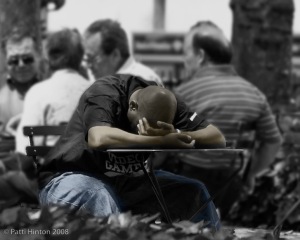 When I was in under my parent’s care, I was hit with a spatula among other things, in what my parents called discipline with “the rod”. This was picked over “time outs,” or being grounded, and my back side broke many a spanking implement–wooden rulers and cooking spoons, frosting spatulas, pancake spatulas, and probably other stuff I’ve blocked out psychologically. (I won’t even go into the things that didn’t or couldn’t brake on my backside!)
When I was in under my parent’s care, I was hit with a spatula among other things, in what my parents called discipline with “the rod”. This was picked over “time outs,” or being grounded, and my back side broke many a spanking implement–wooden rulers and cooking spoons, frosting spatulas, pancake spatulas, and probably other stuff I’ve blocked out psychologically. (I won’t even go into the things that didn’t or couldn’t brake on my backside!)
I guess you could say it sort of got pounded into my mind that God must operate the same way. To me, it seemed he would get peeved, and then, lower the boom. So, when bad things would happen, it was probably because of some kind of Divine spatula. I thought God was like a human, and most likely like a human parent who spanks.
Well, nope. God is “Other.” How we’ve interpreted Scripture has often reflected how we’ve been parented. In other words, we figure that God gets ticked off, and gets out the belt, and begins whipping his kids, until they “get it,” or have been punished sufficiently. Actually he usually lets them get away with murder, if you want to know the truth. But I won’t digress on that right here, and now.
Some years ago I heard a visiting pastor in my church say, “God will sometimes need to give you a whipping. You probably need it, and deserve it.” I maced him. Okay, I didn’t, but I thought if I hadn’t already known God through the character of the Incarnation (Jesus), and fully accepted the fleshly God/man, as the same God, I would have decided then and there to become Buddhist, or something other than whatever this guy was. What a crappy religion if this is the God he describes! This way, God sounds like a craptastic, unloving parent who needs medication. I thought this preacher guy was probably trying to manipulate the audience, and I wasn’t going to fall for his weirdness. I had already encountered God deeply, and I wasn’t going to throw it all away because this preacher pictured God as punitive, and wielding a spatula, or perhaps a thick belt, as I bent over to get my beating. God doesn’t have a spatula. He’s gracious.




